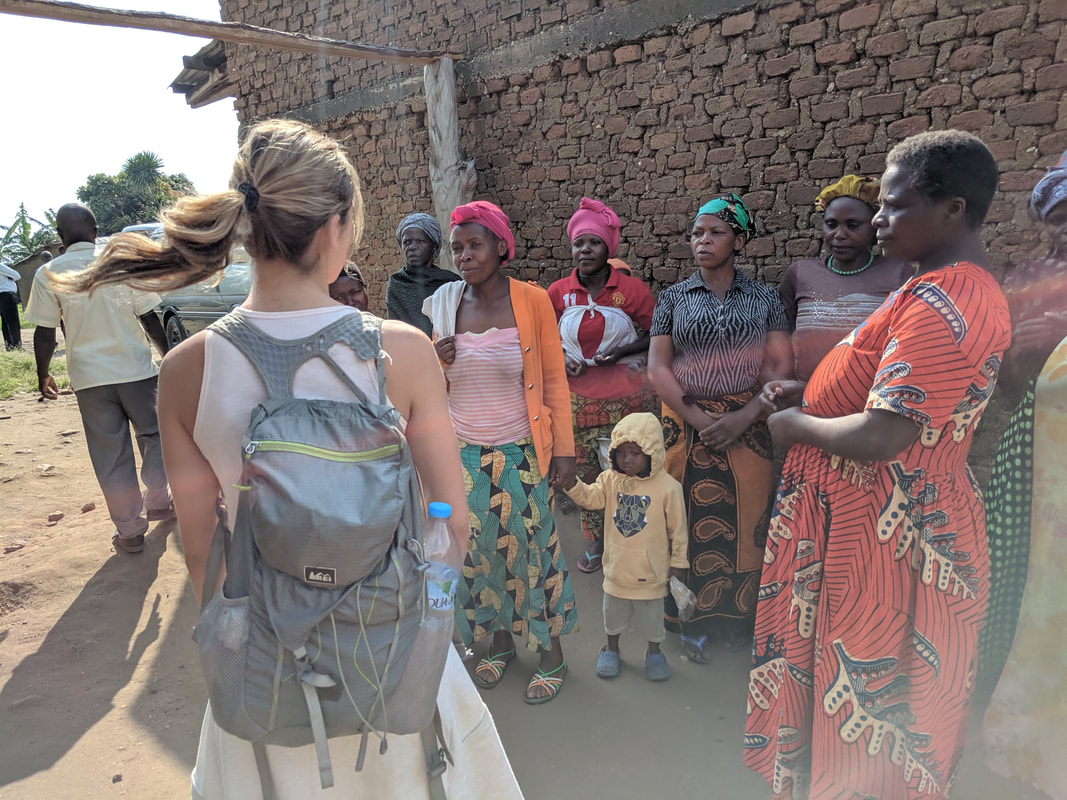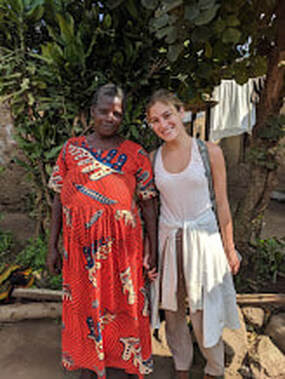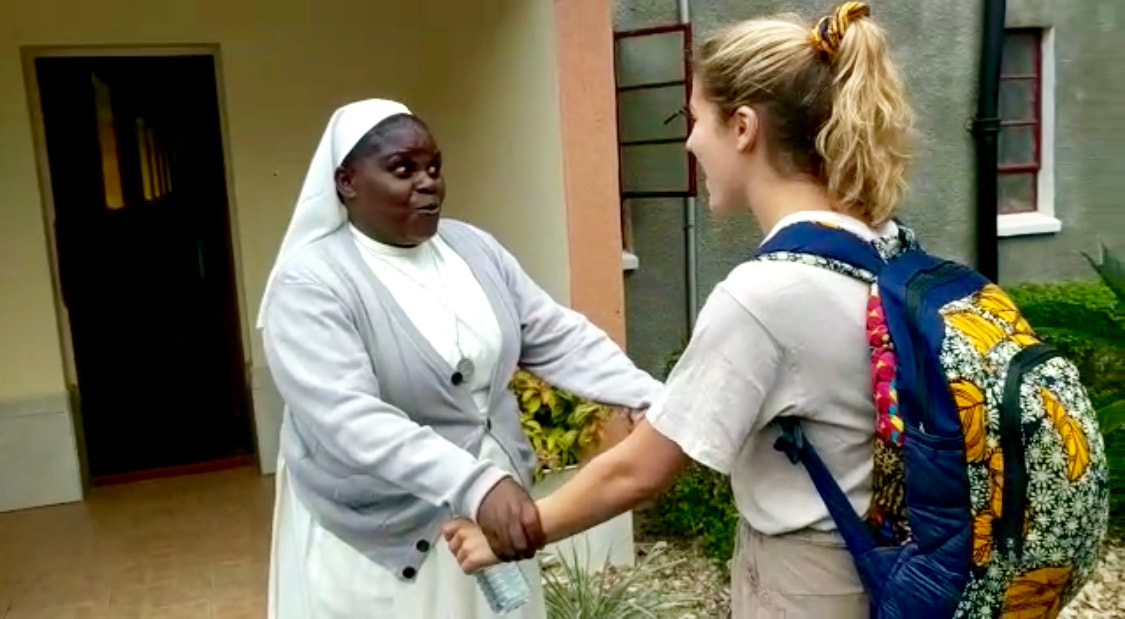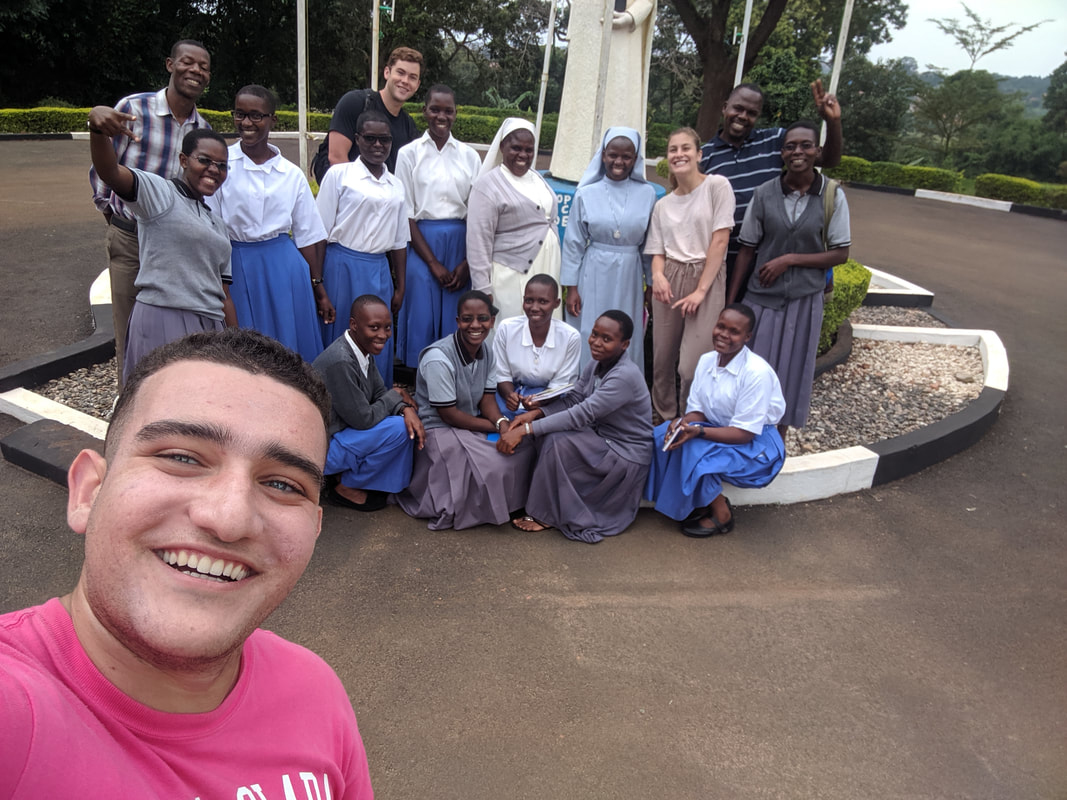My Experience
New York City, Los Angeles, Chicago: there are different levels of hustle and bustle but all of them require one to be vigilant. Kampala, the capital of Uganda, is no exception. From the moment I arrived my guard went on high alert and I was aware of my surroundings at all times. During those initial weeks in Kampala, I experienced growing pains and learned many things about myself. The first was that I needed to toughen up. Living in a hectic, aggressive city did not fit my personality or lifestyle, and I quickly realized that I needed to become more aggressive in order to thrive. Not only did this apply when navigating how to cross the street with Boda Boda drivers, but also in the professional workforce. Working in the main office of NUCAFE in Kampala was both exciting and stressful. As a team, we were interviewing the top management of the organization. I often sank back into my chair or hesitated to ask a question and let my male partners lead the discussion. I struggled with asserting myself in the male-dominated, professional office setting, although I had questions and points I wanted to raise. Experiencing this in the field emphasized my weakness and I began to confront the issue.
I am still working on staying composed when speaking to top-level management and authority figures, as well as trying to have more confidence when articulating my thoughts. I recognize that my insecurity and relaxed personality might jeopardize my professional persona, especially when trying to assert my thoughts in the workplace. Before going into the field I rarely encountered this drawback because I had worked for environmental organizations, which were led by women or in an academic setting. I knew the trait existed subconsciously, but I never had to fully confront it. As uncomfortable as it is to realize and become fully aware of your own weak points, it is vital to becoming the best version of yourself possible. The first step in fixing a problem is to address it. I have not yet entirely become a tough, assertive, and fully confident woman, but I am well on my journey’s way and my time spent in Uganda has led me to a new self-possession.
I am still working on staying composed when speaking to top-level management and authority figures, as well as trying to have more confidence when articulating my thoughts. I recognize that my insecurity and relaxed personality might jeopardize my professional persona, especially when trying to assert my thoughts in the workplace. Before going into the field I rarely encountered this drawback because I had worked for environmental organizations, which were led by women or in an academic setting. I knew the trait existed subconsciously, but I never had to fully confront it. As uncomfortable as it is to realize and become fully aware of your own weak points, it is vital to becoming the best version of yourself possible. The first step in fixing a problem is to address it. I have not yet entirely become a tough, assertive, and fully confident woman, but I am well on my journey’s way and my time spent in Uganda has led me to a new self-possession.
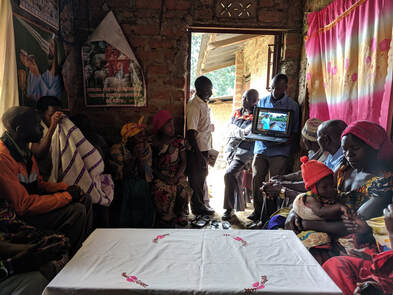 Farmers Watching the Training Videos my Team Made
Farmers Watching the Training Videos my Team Made
When we began venturing into the field to visit different coffee farms, my body slowly became less tense and I started to relax. I yearned for the trips out in the field where I could feel more at peace and connect with coffee farmers. The field uncovered some of my weaknesses but also highlighted my strengths. My speaking skills might have been challenged in the office setting, but out in the village coffee farm, I shined. It was our third coffee farm visit and it was the day we finally were conducting group interviews. I felt a little nervous having to lead my own group interview for the first time and was apprehensive that the farmers would not want to talk or connect with me. I mean why would they? I am a blonde hair blue eyed girl from the United States who has no idea what it is like living in poverty and relying on a cash crop, such as coffee for a living. To my surprise, I was astonished how effortless and easy it was for me and a group of farmers to connect even with having a language barrier. Within a couple of minutes, my group was laughing together, talking over each other, and confiding with me their life as farmers. I realized a couple of things, these people loved information and used every channel they could to obtain it either from the radio, tv, a friends phone, etc. Their willingness to learn and positive response to innovative learning methods impressed me. They knew their situation and wanted to improve it by being open to technology and innovative ideas to advance their lives. My strength and ability to connect with different types of people was exercised in the field. These people might be living in poverty, but they still gossip, still wish for things they know will never happen, still laugh, still complain, still get excited over new ideas, and are hard workers. Not very different from myself or anyone else back in the United States they are people that are suffering from poverty, but not defined by it.
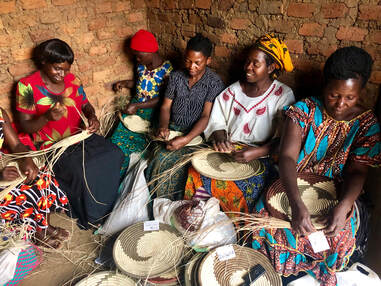 Women Farmers from Karangura Cooperative Basket Weaving
Women Farmers from Karangura Cooperative Basket Weaving
My passion and ability to connect with people grew as we started having more and more group interviews with farmers in different coffee cooperatives. One cooperative, Karangura, was mostly women farmers, and I remember being so impressed by their resilience, I was speechless. In order to talk with us, the women walked a great distance carrying their babies around their waists. They also are the ones who do most of the labor farming as well as finding alternative sources of income. The women in this cooperative set up a basket-weaving club to obtain additional sources of income while waiting for the return on coffee. These women coffee farmers were go-getters, to say the least, and did not pass up any opportunity to gain more information and benefit from new training methods. Interacting with these women made me proud and happy to be exactly where I was. Here they were, walking with their children on their backs in the scorching sun to come to this training to speak with me. I had been driven here in a van and would be driven back to a comfortable guest house. Once there I’d watch a movie and not have to care for multiple children, my own or the neighbors, while taking care of a coffee farm and scraping together all my means to put food on the table. Yet these women wanted to talk with me, hold my hand, and provide insight into what it was like to be a coffee farmer. They brought up their ideas of topics they wanted to see covered in the trainings. They laughed with me, taught me sayings in their local language, and had a positive openness, that allowed me to connect with them just as I would with people back in my home country. I listened to them intently and made sure I was honest because I did not want to let these women down. I knew that I needed to make it clear that I was not going to be in Uganda forever or promising innovative training that would be delivered to them. They expressed nervousness that we would forget them, which still runs through my mind today. It was hard to say that I was leaving and that our paths would most likely not cross in the near future or, if ever, I would be back. I could not give false hope just to feel good at the moment, and even after hearing that truth the women farmers were still overjoyed that we were trying to make recommendations and present research that would, hopefully, benefit their lives. These women made me realize how irrepressible and powerful people can be. It is ironic that in the United States we often think of the poor as being powerless, but in truth, they are often the toughest, most formidable humans.
After visiting with these women I thought that I had seen it all. I had encountered some of the most resilient women I would ever meet, and while that remains true, my experience was not over. We were going to visit the Catholic Sisters in Uganda and incorporate them into our research. Almost immediately I had a negative feeling about it. I was raised Catholic and held some personal resentment and distrust against the Church. As a young girl, my family and I went to Mass on Sunday, and then I was off to CCD and taught that God loves everyone and to be a generous, nice person and God will love you. When I matured this conception and experience I had of being Catholic began to fade. I started putting questions to my CCD teacher such as “Why can’t women be priests?” and when the answer was “That is just how it is,” my young elementary school self was not satisfied. As I got older I discovered more about things the Catholic Church does not approve of and the inner flaws within its hierarchy. The anger surfaced when I learned how the teachings of the Catholic Church personally affected my family. My grandparents are extremely religious Italian Catholics, and unfortunately, my grandmother suffers from mental illness. The more children she had worsened her mental condition, and when both her and my grandpa told their priest how my grandmother could not handle more children, he replied to “act as though you are brother and sister.” Shortly after, she had two more children and things spiraled down from there. When I absorbed this story, my stubborn self decided that was it and to write off the Catholic religion. Therefore, when I found out we were going to incorporate the Catholic sisters into our project, I was not over the moon.
I have been wrong before in my life, but this was an experience I never saw coming. From the moment I stepped on the property of the Sister's congregation, an overwhelming peace came over me. For the first time in a long while, I felt safe and comfortable. We walked into a waiting room where a picture of Mother Teresa was hanging and I immediately sensed my mother's presence, as one of her idols is Mother Teresa (her name happens to be Theresa), coming from the picture. When I was first greeted by Sister Barnabus with a hug, emotion flooded my body. I didn't understand why but I wanted to cry and continue hugging her. An energy of peace and warmth enveloped my body as I moved through the congregation. My muscles relaxed and my guard started to fall. Speaking with Sister Barnabus and the novice Sisters about coffee farming made my skin tingle and lit a fire of excitement. I found their commitment to be coffee farmers and use the profits to help people remarkable. They had the vision to educate others on how to grow coffee and increase their livelihood which brought joy to my heart. I knew that NUCAFE needed to prioritize educating and facilitating these Sisters into becoming coffee farmers. The Sisters once again illustrated a strong, resilient drive and work ethic that would propel them into the kind of success that betters their community.
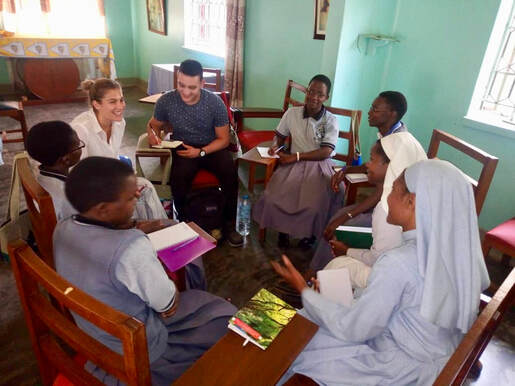 Learning about the Novice Sisters Passion and Knowledge of Coffee Farming
Learning about the Novice Sisters Passion and Knowledge of Coffee Farming
Meeting and working with Sister Barnabus was an experience I’ll never forget. She inspired me with her wisdom, passion, and ability to bond with people. A field trip that I was less than thrilled about became one of the most precious memories of my time in Uganda. If something were to happen I believe I could go there and find a safe haven. It would be the closest thing to home. This experience taught me a valuable lesson about myself. I always knew that I tend to be a tough judge of myself and others. I had previously considered this to be a relatively good trait about myself, although, I discovered that it can cause me to write things and people off prematurely. My time in Uganda allowed me to start to adjust this trait of mine and allow myself to become a more open person.
Not everything and everyone can be perfect and I still do not agree with the Catholic Church completely, but I had blocked myself off from noticing its finer aspects and all of the incredible humanity that makes up the worldwide Church. It took my being in Uganda to sift through family history I’d not shared with anyone. It was something I thought I should keep quiet and sweep under the rug. I realized when a family member has a mental illness you should not have to hide it and pretend your family is perfect because perfection does not equal happiness.
Not everything and everyone can be perfect and I still do not agree with the Catholic Church completely, but I had blocked myself off from noticing its finer aspects and all of the incredible humanity that makes up the worldwide Church. It took my being in Uganda to sift through family history I’d not shared with anyone. It was something I thought I should keep quiet and sweep under the rug. I realized when a family member has a mental illness you should not have to hide it and pretend your family is perfect because perfection does not equal happiness.
My time in the field taught me a lot about how buoyant and open to learning people in Uganda are, how family is valued, and how important recognizing my own strengths and weaknesses turns out to be. I think about all the feisty people I met and how their irrepressible drive has encouraged me to channel their strength in my day-to-day life. I recognized I have an ability to connect with people and find common ground with almost anyone. The experience taught me how in my life I will aspire to work with people, especially women. If there is any great take away from my Uganda encounter it is that women are the greatest untapped resource on the planet and educating and investing in them will help end poverty.
